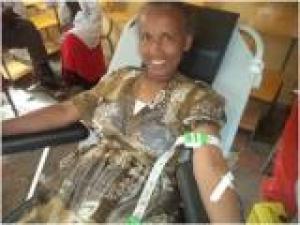One-Month World Blood Donor Day Campaign Ends
Safe blood for saving mothers
The one-month campaign celebrating this year’s World Blood Donor Day (WBDD) was concluded on Sunday, 20 July 2014 in an awards ceremony where regular volunteer blood donors were honored. There is a global move towards encouraging and depending on entirely voluntary, unpaid blood donations in order to secure sustainable and safe blood supply.
Speaking at the event on behalf of the WHO Representative to Ethiopia, WHO Ethiopia’s Health Systems Support Cluster Coordinator, Dr Paul Mainuka confirmed, “An adequate supply can only be assured through regular donations by voluntary unpaid blood donors. WHO’s goal is for all countries to obtain all their blood supplies from voluntary unpaid donors by 2020. I would like to thank you esteemed voluntary blood donors for your contribution in Ethiopia.”
As part of this year’s WBDD celebrations with the theme ,"Give blood to those who give life: Safe blood for saving mothers", Ethiopia had organized a Press Conference, a blood drive, a 1.5 km walk for blood, and this final awards event.
The 1.5km walk for blood took place on 13 July 2014 in the presence of the State Minister of Health, Dr Kebede Worku, and representatives from the US Centers for Disease Control and Prevention and WHO. The walk covered the distance between the Ethio-Cuba Friendship Square and Zewditu Hospital. A blood drive was organized following the walk and tour of blood bank facilities at the hospital, where voluntary blood donors had the opportunity to donate blood.
For Ethiopia, who is making strides to bring MDG 5 – reducing maternal deaths – on target, this year’s WBDD theme is timely and relevant.
WHO has been providing technical assistance and support to expand and consolidate the blood safety programme so as to establish efficient and sustainable national blood transfusion services that can assure the quality, safety and adequacy of blood and blood products to meet the needs of deserving patients since 2004. A comprehensive situation analysis was done, standards, guidelines, blood policy and plan and provision of technical support to its implementation has been provided solely by WHO through the years. Since 2010, WHO supported the restructuring of the blood transfusion services through establishment of the National Blood Transfusion Service (NBTS) under the Federal Ministry of Health (FMoH) as well as transitioning of services from the Ethiopian Red Cross Society (ERCS) to the FMoH. A total of 25 blood banks have been established to cover the transfusion needs of hospitals within 100km radius, thus improving access to the service.



